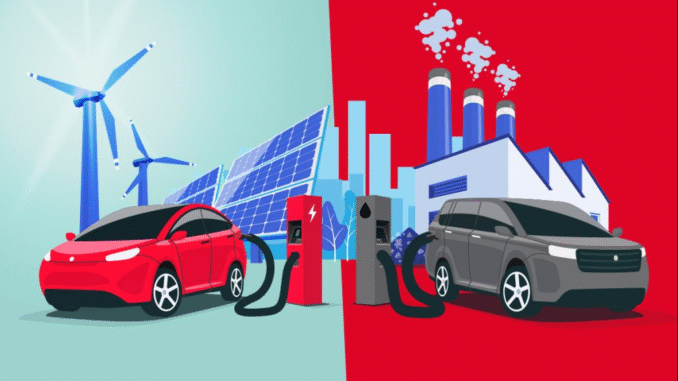
Electric vs Gas Cars: Which One Is Right for You?
As the world moves toward a more sustainable future, the choice between electric and gas-powered vehicles is more relevant than ever. Car buyers today face a key question: Should you go electric or stick with traditional gas-powered cars? The decision isn’t just about environmental impact—it’s also about cost, lifestyle, driving habits, and long-term value.
This comprehensive guide breaks down the key differences between electric vehicles (EVs) and gasoline vehicles, helping you decide which one is the right fit for your needs.
1. Understanding the Basics
What Are Electric Cars?
Electric vehicles (EVs) run entirely on electricity. They have electric motors powered by rechargeable batteries. These batteries are charged by plugging the car into an external power source, typically at home or a charging station.
What Are Gas Cars?
Gasoline vehicles use an internal combustion engine (ICE) that burns fuel (usually gasoline) to power the vehicle. They are refueled at gas stations and are widely used across the world.
2. Cost of Ownership
Upfront Costs
- Electric Cars: EVs often come with a higher initial purchase price due to the cost of batteries. However, prices are dropping as battery technology improves and more affordable models enter the market.
- Gas Cars: Traditional vehicles generally have a lower sticker price, especially in the compact and mid-size categories.
Fueling vs Charging
- Electric Cars: Electricity is cheaper than gasoline. According to the U.S. Department of Energy, EV drivers can save up to 50% on fuel costs compared to gas vehicles.
- Gas Cars: Gasoline prices fluctuate, but they’re usually higher per mile than electricity.
Maintenance Costs
- Electric Cars: Fewer moving parts mean lower maintenance costs. EVs don’t need oil changes, and brake wear is reduced due to regenerative braking.
- Gas Cars: More frequent maintenance is required—oil changes, spark plugs, transmission services, and more.
Winner: Over time, EVs tend to be more cost-effective, despite the higher upfront price.
3. Environmental Impact
Emissions
- Electric Cars: Produce zero tailpipe emissions, making them better for air quality and reducing greenhouse gases.
- Gas Cars: Emit carbon dioxide and other pollutants. Internal combustion engines are a major contributor to global warming.
Energy Source
- EVs: Even when powered by electricity from fossil fuels, EVs are generally cleaner overall. Their environmental benefits increase as the grid becomes greener.
- Gas Cars: Depend entirely on fossil fuels, which are non-renewable and pollutive.
Winner: EVs are the clear choice for environmentally conscious consumers.
4. Performance and Driving Experience
Acceleration and Torque
- Electric Cars: Deliver instant torque, resulting in smooth and quick acceleration. Many EVs can compete with or outperform traditional sports cars.
- Gas Cars: Acceleration depends on engine size and transmission but generally lacks the immediate power of EVs.
Noise and Comfort
- EVs: Run quietly and provide a smoother ride.
- Gas Cars: Produce engine noise and may vibrate more, especially in older models.
Winner: EVs offer a superior driving experience in most categories.
5. Range and Refueling Convenience
Driving Range
- Electric Cars: Modern EVs offer ranges from 150 to over 400 miles per charge, depending on the model. However, range anxiety still concerns some drivers.
- Gas Cars: Generally offer a range of 300 to 500+ miles per tank, making them better for long-distance travel without refueling concerns.
Refueling Time
- EVs: Charging can take anywhere from 30 minutes (fast charger) to several hours (home charging).
- Gas Cars: Refueling is fast—typically 5 minutes or less at any gas station.
Winner: Gas cars win in range and refueling speed, though EV infrastructure is improving.
6. Charging and Fueling Infrastructure
Availability
- Electric Cars: Charging station networks are expanding, but availability varies by location. Urban areas are better equipped than rural ones.
- Gas Cars: Gas stations are everywhere, making refueling convenient and quick.
Home Charging
- EVs: Can be charged at home, which is convenient and cost-efficient. Requires a dedicated outlet or Level 2 charger installation.
- Gas Cars: No home refueling option; must visit a station.
Winner: Gas cars still have better public infrastructure, but EVs offer unmatched home convenience.
7. Longevity and Battery Life
- Electric Cars: Batteries degrade over time, but most last 8 to 10 years or more, with many manufacturers offering warranties.
- Gas Cars: Engines and transmissions also wear down but can last 10–15 years with proper maintenance.
Tip: EV batteries can be replaced, though the cost may be high. Some automakers offer battery leasing or low-cost replacements.
8. Resale Value
- Electric Cars: Early EVs had poor resale value due to limited range and outdated tech. However, newer models are retaining value better as EVs become more mainstream.
- Gas Cars: Generally have predictable depreciation, though rising fuel prices and emissions regulations may reduce long-term appeal.
Consider: Government incentives, tax credits, and rising EV demand are improving resale values for electric vehicles.
9. Government Incentives
- Electric Cars: Often eligible for tax credits, rebates, and other incentives, depending on your country or state. These can significantly lower the total cost.
- Gas Cars: Typically do not receive incentives and may face future penalties or taxes in environmentally focused regions.
Winner: EVs get a clear boost from policies supporting clean energy.
10. Ideal Use Cases
| Situation | Best Choice |
|---|---|
| Short city commutes | Electric |
| Long-distance travel | Gas |
| Environmentally conscious | Electric |
| Budget-conscious buyer | Depends on use—EVs cheaper long-term |
| No home charging access | Gas |
| Urban areas with charging stations | Electric |
| Rural areas with few chargers | Gas |
Final Verdict: Which One Is Right for You?
Choose Electric Cars if:
- You want to reduce your carbon footprint.
- You drive mostly in the city or commute short to medium distances.
- You have access to home charging.
- You want lower fuel and maintenance costs.
- You qualify for government incentives.
Choose Gas Cars if:
- You frequently drive long distances or in rural areas.
- You need fast refueling on the go.
- You want lower upfront costs.
- You don’t have easy access to charging stations.
Conclusion
Both electric and gas-powered vehicles have their strengths and weaknesses. The right choice comes down to your lifestyle, driving habits, budget, and environmental priorities. As technology continues to evolve and charging infrastructure improves, electric vehicles are quickly becoming a practical option for more drivers.
Whether you’re drawn to the cutting-edge innovation of EVs or the proven reliability of gas engines, making an informed choice ensures you get the most value and satisfaction from your next vehicle.

